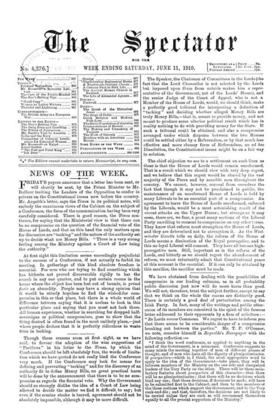We have abstained from dealing with the possibilities of compromise
in our leading columns, as in all probability
public discussion just now will do more harm than good. We will not, therefore, treat the subject further, except to say that we think on the whole the omens are distinctly good. There is certainly a good deal of perturbation among the
Irish Party. In fact, many of the writings and public utter- ances of its members are conceived in the spirit of the famous letter addressed to their opponents by a firm of solicitors :— " Re Lords versus Commons. We regret to have to inform you that there seems to be considerable danger of a compromise breaking out between the parties." Mr. T. P. O'Connor, we note, consoles himself in Reynolds's Newspaper with the following reflection
:- "I think the word conference, as applied to anything in the mind of the Government, is a misnomer. Conference suggests to many minds the meeting together of men of different phases of thought, and of men who have all the dignity of plenipotentiaries. If pourpariers—which is, I think, the most appropriate word to apply to the idea of the Government—take place, they will be between members of the Ministry on the one side and recognised leaders of the Tory Party on the other. There will be those satis- factory featuies about pourparlers of this character—that there will be no plenipotentiaries ; that there will be no decisions which bind any one; that these decisions, if decisions be made, will have to be submitted first to the Cabinet, and then to the members of the three sections which support the Government, and to the Tory rank-and-filo ; and that, therefore, the decisions are not likely to be carried naleaa they are such as will recommend themselves equally to all the present supporters of the Ministry."














































